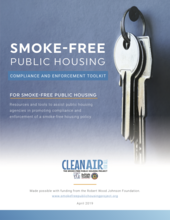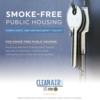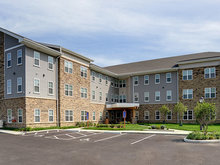0
Publication
Community:
Sep 23, 2022
NCHPH has catalogued promising practices on health center and housing partnerships that were identified during T/TA activities. Some promising practices in this publication include collaboration strategies to address COVID-19, flu vaccination efforts, smoking cessation, access to health care, and more.
Authored by: National Center for Health in Public Housing (NCHPH)
Topics: Health
 Shared by Gabe Castro
Shared by Gabe Castro
Gabe Castro posted a
on Sep 23, 2022
National Center for Health in Public Housing (NCHPH)
NCHPH has catalogued promising practices on health center and housing partnerships that were identified during T/TA activities.
0
Publication
Community:
Sep 23, 2022
This brief describes the findings of an online mapping resource that shows the distribution of Social Determinants of Health (SDOH) indicators across counties with Public Housing Primary Care (PHPC) health centers.
Authored by: National Center for Health in Public Housing (NCHPH)
Topics: Place-based
 Shared by Gabe Castro
Shared by Gabe Castro
Gabe Castro posted a
on Sep 23, 2022
National Center for Health in Public Housing (NCHPH)
This brief describes the findings of an online mapping resource that shows the distribution of Social Determinants of Health (SDOH) indicators across counties with Public Housing Primary Care (PHPC) health centers.
0
Publication
Community:
Sep 23, 2022
Getting regular exercise can be a challenge, but there are many positive benefits, particularly for
people with diabetes.
Authored by: Health Resources and Services Administration (HRSA) of the U.S. Department of Health and Human Services (HHS)
Topics: Exercise, Health, Healthy homes, Nutrition
 Shared by Gabe Castro
Shared by Gabe Castro
Gabe Castro posted a
on Sep 23, 2022
Health Resources and Services Administration (HRSA) of the U.S. Department of Health and Human Services (HHS)
Getting regular exercise can be a challenge, but there are many positive benefits, particularly for
people with diabetes.
0
Publication
Community:
Sep 23, 2022
The Effects of ‘Food Deserts’ on Public Housing Residents Living with Diabetes
Authored by: National Center for Health in Public Housing
Topics: Energy, Exercise, Health, Healthy homes, Mobility, Nutrition
 Shared by Gabe Castro
Shared by Gabe Castro
Gabe Castro posted a
on Sep 23, 2022
National Center for Health in Public Housing
The Effects of ‘Food Deserts’ on Public Housing Residents Living with Diabetes
0
Publication
Community:
May 1, 2022
This toolkit by NCHPH and NNCC provides information and resources for health center staff to partner and collaborate more effectively with their local housing authorities and with other providers serving residents of public housing and other low-income housing.
Authored by: National Center of Health In Public Housing
Topics: Health, Partnerships
 Shared by Camille Anoll-Hunter
Shared by Camille Anoll-Hunter
Camille Anoll-Hunter posted a
on Sep 23, 2022
National Center of Health In Public Housing
This toolkit by NCHPH and NNCC provides information and resources for health center staff to partner and collaborate more effectively with their local housing authorities and with other providers serving residents of public housing and other low-income housing.
0
Research
Community:
Jul 19, 2022
This ebook, authored by Next City, explores ways that creative placemaking can expand opportunities for low-income people living in disinvested communities.
The journalism Next City has produced for the series “For Whom, By Whom” chronicles how creative placemaking can expand opportunities for low-income people living in disinvested communities. These stories give lie to the false narrative that such neighborhoods are home to violence and deprivation instead of talent, imagination, and solutions. Here are communities that produce incredible feats despite being terminally under-resourced, and despite systemic neglect that has persisted for generations.
Authored by:
Topics: Community development, Mobility, Place-based, Racial inequalities, Research
 Shared by Malcolm Guy
Shared by Malcolm Guy
Malcolm Guy posted a
on Jul 19, 2022
This ebook, authored by Next City, explores ways that creative placemaking can expand opportunities for low-income people living in disinvested communities.
The journalism Next City has produced for the series “For Whom, By Whom” chronicles how creative placemaking can expand opportunities for lo
0
Publication
Community:
Oct 21, 2021
State and local policymakers are making consequential decisions about the treatment of race and racism in schools. It is crucial, right now, to slow down, consider the evidence from research and experience, and apply that knowledge to improve teaching about race and racism.
Authored in partnership between the Aspen Institute Education & Society Program and Dr. Francesca López, Professor & Waterbury Chair of Equity Pedagogy at Penn State University, United We Learn looks at empirical research on teaching about race and racism, across more than 40 studies on child development, beliefs about academic ability, positive ethnic-racial identity, and sense of belonging.
Authored by: Aspen Institute
Topics: Education, Racial inequalities, Research
 Shared by Kirsten Greenwell
Shared by Kirsten Greenwell
Kirsten Greenwell posted a
on Oct 22, 2021
State and local policymakers are making consequential decisions about the treatment of race and racism in schools. It is crucial, right now, to slow down, consider the evidence from research and experience, and apply that knowledge to improve teaching about race and racism.
0
Publication
Community:
Aug 26, 2021
The National CLAS Standards are intended to advance health equity, improve quality, and help eliminate health care disparities by establishing a blueprint for health and health care organizations
Authored by: Think Cultural Health, an initiative of the Office of Minority Health, U.S. Department of Health & Human Services.
Topics: Communications, Health, Immigrants
 Shared by Camille Anoll-Hunter
Shared by Camille Anoll-Hunter
Camille Anoll-Hunter posted a
on Aug 26, 2021
Think Cultural Health, an initiative of the Office of Minority Health, U.S. Department of Health & Human Services.
The National CLAS Standards are intended to advance health equity, improve quality, and help eliminate health care disparities by establishing a blueprint for health and health care organizations
0
Publication
Community:
Jan 14, 2021
A Playbook for Local Health Department Strategies in the United States
Authored by: The National Community-Based Workforce Alliance
Topics: COVID-19, Health
 Shared by Camille Anoll-Hunter
Shared by Camille Anoll-Hunter
Camille Anoll-Hunter posted a
on Aug 26, 2021
The National Community-Based Workforce Alliance
A Playbook for Local Health Department Strategies in the United States
0
Publication
Community:
Jun 17, 2021
Authored by: U.S. Department of Housing and Urban Development Choice Neighborhoods
Topics: Attendance, COVID-19, Early childhood, Education, Family engagement, Housing, Low-income, Out-of-school time, Youth
 Shared by Kirsten Greenwell
Shared by Kirsten Greenwell
Kirsten Greenwell posted a
on Jun 17, 2021
U.S. Department of Housing and Urban Development Choice Neighborhoods
0
Publication
Community:
Oct 3, 2019
A majority of property managers report that a smoke-free policy is largely well followed and self enforced by residents and staff. However, it is not uncommon for a small minority of residents to struggle or refuse to comply by continuing to smoke or allowing their guests to smoke on the property. These resources and tools can assist management in promoting compliance and enforcing the policy when necessary. If you would like to consult on solutions specific to your situation, reach out to info@smokefreepublichousingproject.org.
Authored by: Clean Air for All
Topics: Health, Healthy homes, Smoke-free
 Shared by Jackie Siewert
Shared by Jackie Siewert
Jackie Siewert posted a
on Oct 3, 2019
A majority of property managers report that a smoke-free policy is largely well followed and self enforced by residents and staff. However, it is not uncommon for a small minority of residents to struggle or refuse to comply by continuing to smoke or allowing their guests to smoke on the property.
0
Research
Community:
Aug 5, 2019
CLPHA developed a general data sharing template that public housing authorities (PHAs) and their health partners can customize to suit their data sharing and collaboration needs. Please feel free to comment to share any uses/modifications your organization made to implement into a partnership.
Authored by:
Topics: Affordable Care Act, CLPHA, Community development, Cost effectiveness, Data sharing, Dental, Depression, Dual-eligibles, Funding, Health, Healthy homes, Legislation & Policy, Low-income, Medicaid / Medicare, Mental health, Metrics, MTW, Nutrition, Obesity, Partnerships, Place-based, Preventative care, Racial inequalities, Research, SAMHSA, Smoke-free, Stability, Substance abuse, Supportive housing, Sustainability, TA
 Shared by Steve Lucas
Shared by Steve Lucas
Steve Lucas posted a
on Aug 5, 2019
Disclaimer: This template is provided for informational purposes only and not for the purpose of providing legal advice. You should contact your attorney to obtain advice with respect to any particular issue or question. Use of this template, including its exhibits and attachments, does not create a relationship or any responsibilities between CLPHA and the user.
CLPHA developed a general data sharing template that public housing authorities (PHAs) and their health partners can customize to suit their data sharing and collaboration needs. Please feel free to comment to share any uses/modifications your organization made to implement into a partnership.
0
Publication
Community:
May 30, 2019
A more regional approach to care is needed – one that involves coordinated, person-centered healthcare with robust connections to social services and community resources. An innovative infrastructure to do just that is underway in four communities across New Jersey: Trenton, Camden, Newark, and Paterson. Efforts begun in 2011 under New Jersey’s Medicaid Accountable Care Organization (ACO) Demonstration Project have evolved into four regional collaboratives that integrate, coordinate, and align all the disconnected programs aimed at making communities healthier.
Authored by: Kathleen Noonan and Jon Tew for Camden Coaliton of Healthcare Providers
Topics: Data sharing, East Coast, Health, Partnerships
 Shared by Housing Is
Shared by Housing Is
Housing Is posted a
on Jun 13, 2019
Kathleen Noonan and Jon Tew for Camden Coaliton of Healthcare Providers
A more regional approach to care is needed – one that involves coordinated, person-centered healthcare with robust connections to social services and community resources.
0
Research
Community:
Mar 25, 2019
The articles below are part of a special collection commemorating 25 years of the Health Care System Research Network’s (HCSRN's) rigorous research to improve health outcomes and health systems’ performance by leveraging electronic health data. This new collection highlights, among other things, advances in personalized cancer care, the optimal use of AI in health care, and the evolution of common data models, featuring work from Kaiser Permanente, Intermountain Healthcare and others.
Authored by: The Journal for Electronic Health Data and Methods
Topics: Data sharing, Health, Partnerships, Research
 Shared by Housing Is
Shared by Housing Is
Housing Is posted a
on Jun 13, 2019
The Journal for Electronic Health Data and Methods
The articles below are part of a special collection commemorating 25 years of the Health Care System Research Network’s (HCSRN's) rigorous research to improve health outcomes and health systems’ performance by leveraging electronic health data.
0
Publication
Community:
Jun 12, 2019
Zoning rules dictate more than just how we can use and build on land. They also shape our communities and our lives. Land use laws determine where we can find housing, schools, and parks—and who has access to them.
Authored by: Maya Brennan, Emily Peiffer, and Kimberly Burrowes for How Housing Matters, The Urban Institute
Topics: Health, Housing, Legislation & Policy, Racial inequalities
 Shared by Housing Is
Shared by Housing Is
Housing Is posted a
on Jun 13, 2019
Maya Brennan, Emily Peiffer, and Kimberly Burrowes for How Housing Matters, The Urban Institute
Zoning rules dictate more than just how we can use and build on land. They also shape our communities and our lives. Land use laws determine where we can find housing, schools, and parks—and who has access to them.
0
Publication
Community:
Opened in summer 2018 on the north side of Columbus, Ohio, Laurel Green Apartments is an affordable permanent supportive housing development for residents with mental health conditions.
Authored by: PD&R Edge Online Magazine
Topics: Homelessness, Housing, Low-income, Mental health, Supportive housing
 Shared by Housing Is
Shared by Housing Is
Housing Is posted a
on Jun 11, 2019
PD&R Edge Online Magazine
Opened in summer 2018 on the north side of Columbus, Ohio, Laurel Green Apartments is an affordable permanent supportive housing development for residents with mental health conditions.
0
Publication
Community:
Jun 11, 2019
The Trump Administration is publicly weighing plans to gradually lower the official poverty line by applying a smaller cost-of-living adjustment each year. Doing so would be unjustified for several reasons.
Authored by: Arloc Sherman and Paul Van de Water for The Center on Budget and Policy Priorities
Topics: Child welfare, Food insecurity, Legislation & Policy, Low-income, Nutrition, Stability
 Shared by Housing Is
Shared by Housing Is
Housing Is posted a
on Jun 11, 2019
Arloc Sherman and Paul Van de Water for The Center on Budget and Policy Priorities
The Trump Administration is publicly weighing plans to gradually lower the official poverty line by applying a smaller cost-of-living adjustment each year. Doing so would be unjustified for several reasons.
0
Publication
Community:
Jun 11, 2019
Authored by Civic and the Everyone Graduates Center at the Johns Hopkins University School of Education, and released annually in partnership with the Alliance for Excellent Education and America’s Promise Alliance, the Building a Grad Nation report examines both progress and challenges toward reaching the GradNation campaign goal of a national on-time graduation rate of 90 percent.
Authored by: Civic and the Everyone Graduates Center at Johns Hopkins University School of Education
Topics: Education, Low-income, Research, Youth
 Shared by Housing Is
Shared by Housing Is
Housing Is posted a
on Jun 11, 2019
Civic and the Everyone Graduates Center at Johns Hopkins University School of Education
Authored by Civic and the Everyone Graduates Center at the Johns Hopkins University School of Education, and released annually in partnership with the Alliance for Excellent Education and America’s Promise Alliance, the Building a Grad Nation report examines both progress and challenges toward reach
0
Publication
Community:
This paper analyzes why SNAP benefits are inadequate, reviews the body of research showing positive effects from more adequate SNAP benefits, and offers key policy solutions to improve benefit adequacy.
Authored by: Food Research & Action Center (FRAC)
Topics: Food insecurity, Health, Legislation & Policy, Low-income, Nutrition, Research
 Shared by Housing Is
Shared by Housing Is
Housing Is posted a
on Jun 11, 2019
Food Research & Action Center (FRAC)
This paper analyzes why SNAP benefits are inadequate, reviews the body of research showing positive effects from more adequate SNAP benefits, and offers key policy solutions to improve benefit adequacy.
0
Infographics
Community:
Breakdown by state
Authored by: Center on Budget and Policy Priorities
Topics: Homelessness, Housing, Immigrants, Legislation & Policy
 Shared by Housing Is
Shared by Housing Is
Housing Is posted a
on Jun 7, 2019
Center on Budget and Policy Priorities
0
Research
Community:
Jun 5, 2019
A new report by Chapin Hall at the University of Chicago finds that youth homelessness has its origins in early family experiences, including family homelessness. The findings make painfully clear that housing alone is insufficient to prevent and “end” youth homelessness, and that addressing youth homelessness alone, without explicit connections and fervent attention to family homelessness, will result in continued homelessness for all populations.
Authored by: SchoolHouse Connection
Topics: Early childhood, Homelessness, Housing, Legislation & Policy
 Shared by Housing Is
Shared by Housing Is
Housing Is posted a
on Jun 5, 2019
A new report by Chapin Hall at the University of Chicago finds that youth homelessness has its origins in early family experiences, including family homelessness.
0
Research
Community:
May 30, 2019
Children experiencing homelessness or living in inadequate and unstable housing are exposed to many risks, including a heightened threat of involvement with the child welfare system. Can child welfare agencies play a role in addressing the lack of affordable housing? What if providing housing, plus other supportive services, could prevent out-of-home placements to foster care? What if, for those children already in foster care, it could help them reunify with their parents?
Authored by: Mary K. Cunningham, Mike Pergamit, and Sarah Gillespie for The Urban Institute
Topics: Child welfare, Research, Stability, Supportive housing
 Shared by Housing Is
Shared by Housing Is
Housing Is posted a
on May 30, 2019
Mary K. Cunningham, Mike Pergamit, and Sarah Gillespie for The Urban Institute
Children experiencing homelessness or living in inadequate and unstable housing are exposed to many risks, including a heightened threat of involvement with the child welfare system. Can child welfare agencies play a role in addressing the lack of affordable housing?
0
Publication
Community:
May 1, 2019
Navigating college as a first-generation college student can feel like making your way through a maze with no map, filled with “learn as you go” lessons, and “wow, I wish I knew this then.” When you combine it with being low-income, homeless, and/or food insecure, it can feel like you’re navigating the same maze blindfolded, on a tightrope, balancing multiple responsibilities. It should not be like this.
Authored by: Miguel Arellano Sanchez for SchoolHouse Connection
Topics: Low-income, Post-secondary, Stability, Youth
 Shared by Housing Is
Shared by Housing Is
Housing Is posted a
on May 29, 2019
Miguel Arellano Sanchez for SchoolHouse Connection
Navigating college as a first-generation college student can feel like making your way through a maze with no map, filled with “learn as you go” lessons, and “wow, I wish I knew this then.” When you combine it with being low-income, homeless, and/or food insecure, it can feel like you’re navigating
0
Publication
Community:
May 24, 2019
There’s a growing body of evidence that positively links affordable, stable, and quality housing with improved educational outcomes for children. That research continually points to the positive return on investment for the earliest possible intervention. Housing authorities are uniquely poised to help change the trajectory for low-income children who typically arrive in kindergarten already substantially behind their peers. We can leverage unique assets that other systems players cannot.
Authored by: Betsey Martens and Erica Plut for Journal of Housing and Community Development
Topics: Early childhood, Education, Housing, Out-of-school time, Partnerships
 Shared by Housing Is
Shared by Housing Is
Housing Is posted a
on May 28, 2019
Betsey Martens and Erica Plut for Journal of Housing and Community Development
There’s a growing body of evidence that positively links affordable, stable, and quality housing with improved educational outcomes for children. That research continually points to the positive return on investment for the earliest possible intervention.
0
Publication
Community:
May 20, 2019
African-Americans are three times more likely to die from asthma as whites. In Philadelphia and elsewhere, how can outcomes improve with changes to housing quality and pollution control?
Authored by: Sophia Newman for Next City
Topics: Asthma, Health, Housing, Low-income, Racial inequalities
 Shared by Housing Is
Shared by Housing Is
Housing Is posted a
on May 23, 2019
Sophia Newman for Next City
African-Americans are three times more likely to die from asthma as whites. In Philadelphia and elsewhere, how can outcomes improve with changes to housing quality and pollution control?
 Shared by Gabe Castro
on Sep 23, 2022
Shared by Gabe Castro
on Sep 23, 2022
 Shared by Gabe Castro
on Sep 23, 2022
Shared by Gabe Castro
on Sep 23, 2022
 Shared by Gabe Castro
on Sep 23, 2022
Shared by Gabe Castro
on Sep 23, 2022
 Shared by Gabe Castro
on Sep 23, 2022
Shared by Gabe Castro
on Sep 23, 2022
 Shared by Camille Anoll-Hunter
on Sep 23, 2022
Shared by Camille Anoll-Hunter
on Sep 23, 2022
 Shared by Malcolm Guy
on Jul 19, 2022
Shared by Malcolm Guy
on Jul 19, 2022
 Shared by Kirsten Greenwell
on Oct 22, 2021
Shared by Kirsten Greenwell
on Oct 22, 2021
 Shared by Camille Anoll-Hunter
on Aug 26, 2021
Shared by Camille Anoll-Hunter
on Aug 26, 2021
 Shared by Camille Anoll-Hunter
on Aug 26, 2021
Shared by Camille Anoll-Hunter
on Aug 26, 2021
 Shared by Kirsten Greenwell
on Jun 17, 2021
Shared by Kirsten Greenwell
on Jun 17, 2021

 Shared by Jackie Siewert
on Oct 3, 2019
Shared by Jackie Siewert
on Oct 3, 2019

 Shared by Steve Lucas
on Aug 5, 2019
Shared by Steve Lucas
on Aug 5, 2019

 Shared by Housing Is
on Jun 13, 2019
Shared by Housing Is
on Jun 13, 2019

 Shared by Housing Is
on Jun 13, 2019
Shared by Housing Is
on Jun 13, 2019
 Shared by Housing Is
on Jun 13, 2019
Shared by Housing Is
on Jun 13, 2019

 Shared by Housing Is
on Jun 11, 2019
Shared by Housing Is
on Jun 11, 2019

 Shared by Housing Is
on Jun 11, 2019
Shared by Housing Is
on Jun 11, 2019
 Shared by Housing Is
on Jun 11, 2019
Shared by Housing Is
on Jun 11, 2019

 Shared by Housing Is
on Jun 11, 2019
Shared by Housing Is
on Jun 11, 2019

 Shared by Housing Is
on Jun 7, 2019
Shared by Housing Is
on Jun 7, 2019

 Shared by Housing Is
on Jun 5, 2019
Shared by Housing Is
on Jun 5, 2019

 Shared by Housing Is
on May 30, 2019
Shared by Housing Is
on May 30, 2019

 Shared by Housing Is
on May 29, 2019
Shared by Housing Is
on May 29, 2019

 Shared by Housing Is
on May 28, 2019
Shared by Housing Is
on May 28, 2019
 Shared by Housing Is
on May 23, 2019
Shared by Housing Is
on May 23, 2019



